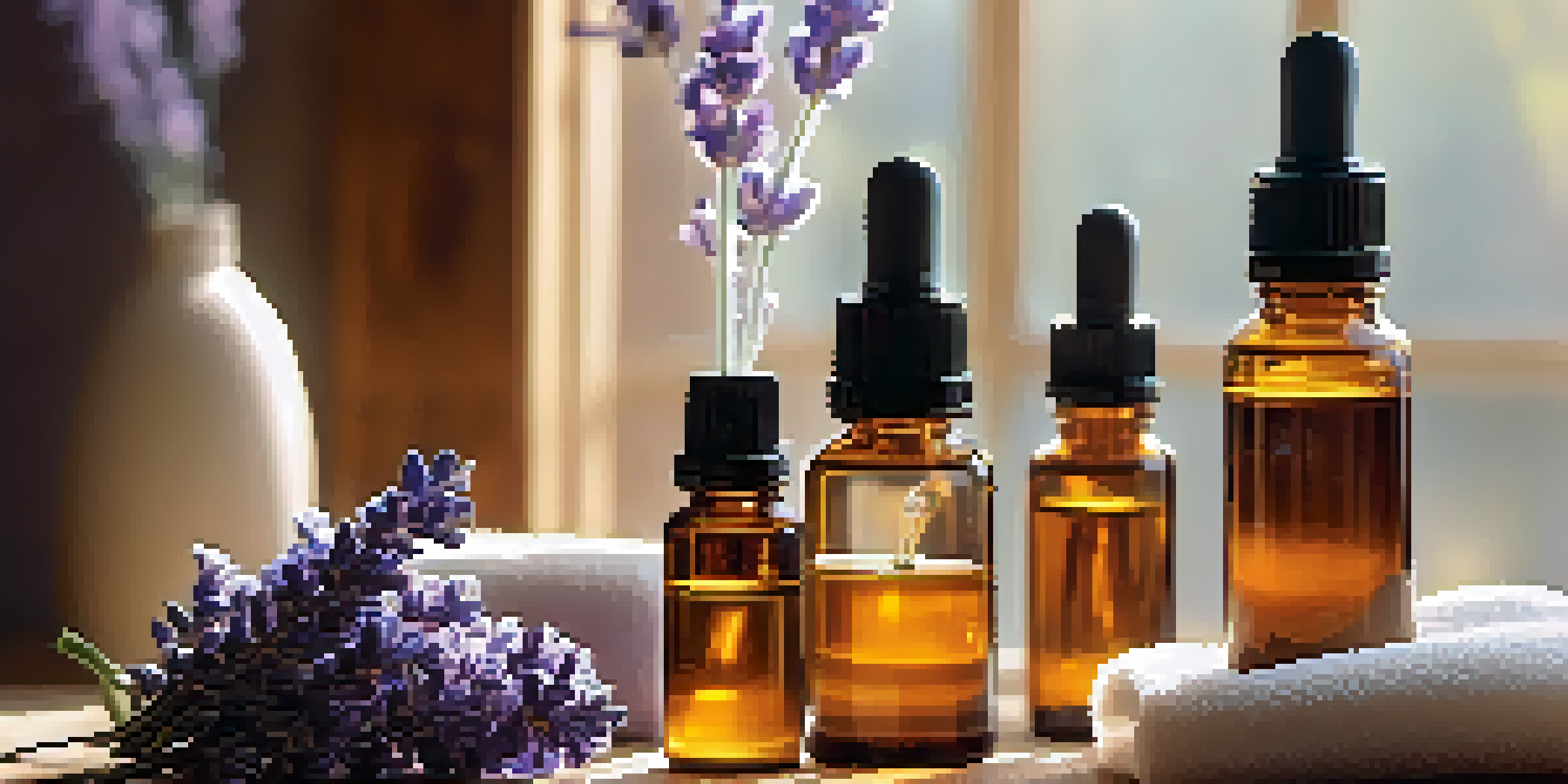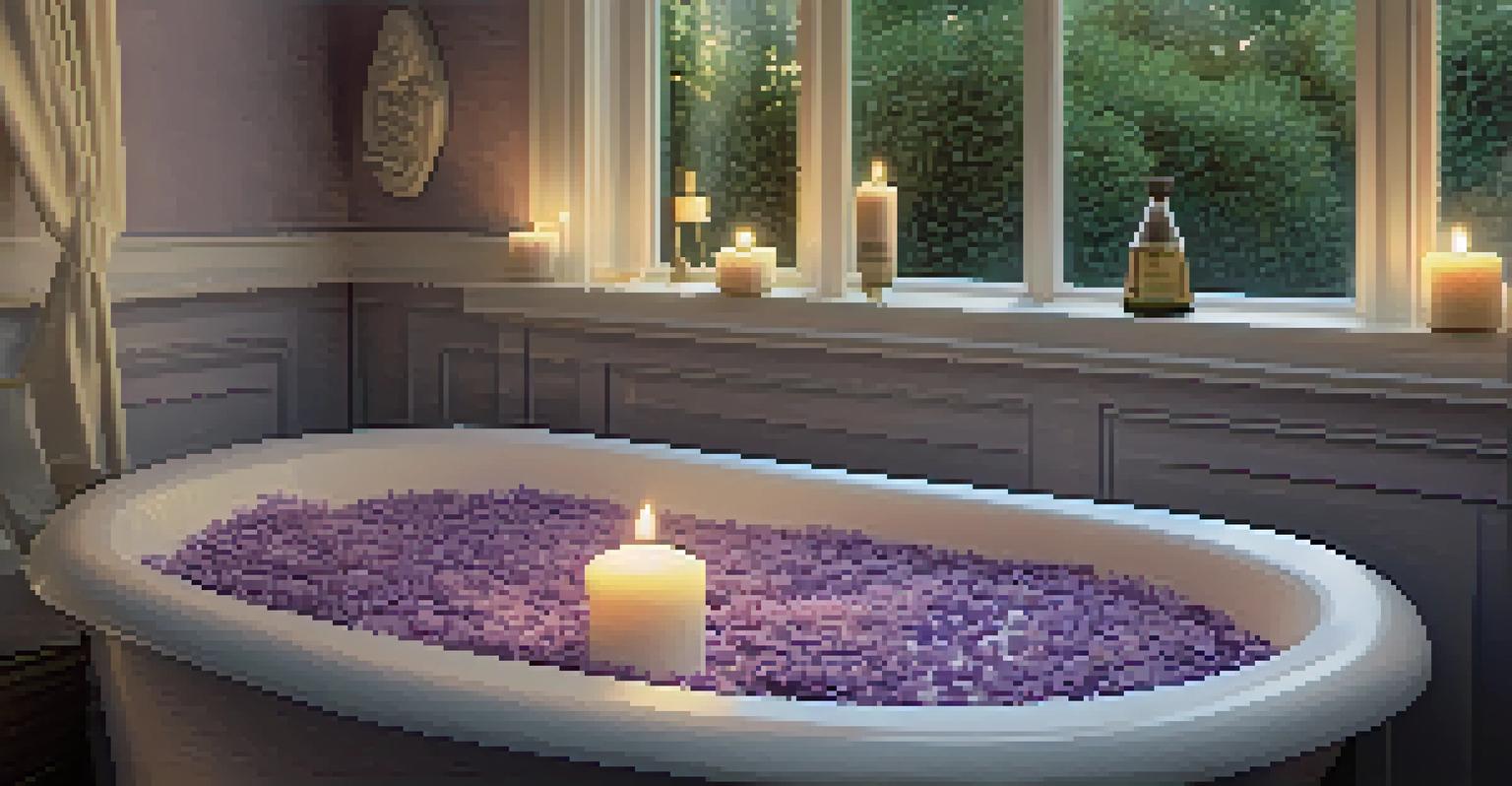Understanding Aromatherapy: History, Benefits, and Techniques

The Rich History of Aromatherapy Through the Ages
Aromatherapy has roots that trace back thousands of years, intertwining with ancient cultures. From the Egyptians using essential oils for embalming to the Greeks who embraced them for health benefits, this practice has evolved significantly. Historical texts reveal that essential oils were not just for fragrance; they played a pivotal role in religion, medicine, and cosmetics.
The use of essential oils is a powerful tool for emotional healing and overall well-being.
In the Middle Ages, the use of aromatics expanded as trade routes opened, bringing exotic scents to Europe. The advent of distillation in the 11th century allowed for the extraction of oils, enhancing their use in both healing and perfumery. This era marked a turning point, paving the way for modern essential oil practices we know today.
Fast forward to the 20th century, when French chemist René-Maurice Gattefossé coined the term 'aromatherapy.' His accidental discovery of lavender oil's healing properties ignited interest in the therapeutic potential of essential oils. Since then, aromatherapy has gained traction as a holistic approach to health and wellness.
What Is Aromatherapy and How Does It Work?
Aromatherapy is the practice of using essential oils extracted from plants for therapeutic purposes. These concentrated oils capture the plant's natural fragrance and properties, which can have various effects on the mind and body. When inhaled or applied topically, essential oils are believed to influence our mood, emotions, and overall health.

The way aromatherapy works is deeply rooted in our sense of smell, which is closely linked to the brain's limbic system. This part of the brain regulates emotions and memories, explaining why certain scents can evoke feelings of calmness or joy. For instance, inhaling lavender oil might help reduce anxiety, while citrus oils can uplift your mood.
Aromatherapy's Rich History
Aromatherapy has evolved from ancient practices in cultures like Egypt and Greece to a modern holistic approach for health and wellness.
Additionally, essential oils can be absorbed through the skin, offering localized benefits. When applied during massages or added to baths, they can enhance relaxation and relieve tension. Understanding how aromatherapy interacts with our senses is key to harnessing its full potential.
The Health Benefits of Aromatherapy You Should Know
Aromatherapy offers a wide array of health benefits that can enhance your well-being. One of the most recognized advantages is stress relief; many people turn to essential oils like chamomile and bergamot to help alleviate anxiety. Regular use can lead to a more relaxed state of mind, making it easier to navigate daily challenges.
Aromatherapy is not just about the scent, it’s about the emotional experience it creates.
Moreover, aromatherapy can support physical health, aiding issues such as headaches, digestive problems, and even respiratory conditions. For example, peppermint oil is often used to relieve headaches, while eucalyptus can help with congestion. These natural remedies provide a gentle alternative to pharmaceutical solutions.
Lastly, aromatherapy promotes better sleep, an essential aspect of overall health. Oils like lavender and sandalwood are known for their calming effects, making them popular choices for bedtime routines. By incorporating these scents, you may find it easier to drift off into a restorative sleep.
Common Essential Oils and Their Unique Properties
There’s a vast array of essential oils available, each with its unique characteristics and benefits. Lavender oil is perhaps the most well-known for its calming properties, making it a staple in relaxation practices. On the other hand, tea tree oil is celebrated for its antiseptic qualities and is commonly used in skincare.
Citrus oils, such as lemon and orange, are uplifting and energizing. They can enhance focus and mood, making them excellent choices for daytime use. Meanwhile, oils like frankincense and sandalwood are often used for meditation and grounding, helping to create a peaceful atmosphere.
Health Benefits of Essential Oils
Essential oils provide various health benefits, including stress relief, improved sleep, and support for physical ailments.
It’s essential to choose the right oil for your needs. Some oils may work better for stress relief, while others might be more effective for physical ailments. Exploring different oils can be a rewarding journey, allowing you to customize your aromatherapy experience.
Techniques for Incorporating Aromatherapy into Daily Life
Incorporating aromatherapy into your daily routine can be simple and enjoyable. One popular method is using a diffuser, which disperses essential oils into the air, filling your space with delightful aromas. You can choose specific oils depending on your mood or desired effect, creating a personalized atmosphere.
Another effective technique is topical application, where essential oils are mixed with carrier oils like coconut or jojoba oil. This method allows you to enjoy the benefits of aromatherapy while providing nourishment to your skin. Just remember to perform a patch test to ensure you don’t have any adverse reactions.
Lastly, consider adding essential oils to your bath or skincare regimen. A few drops of your favorite oil can transform a normal bath into a spa-like experience, promoting relaxation and rejuvenation. With so many ways to use aromatherapy, you can easily tailor it to fit your lifestyle.
Safety Tips for Using Essential Oils Effectively
While aromatherapy is generally safe, it’s important to use essential oils responsibly. Always dilute them with a carrier oil before applying to the skin, as undiluted oils can cause irritation. A good rule of thumb is to mix one part essential oil with three parts carrier oil for safe topical use.
Additionally, some essential oils may not be suitable for everyone. Pregnant women, individuals with certain health conditions, and young children should exercise caution and consult a healthcare professional before using specific oils. Researching each oil's safety profile ensures you make informed choices.
Safe Use of Essential Oils
To enjoy the benefits of aromatherapy, it's crucial to use essential oils responsibly, ensuring proper dilution and awareness of safety guidelines.
It’s also wise to store essential oils properly, keeping them in a cool, dark place to maintain their potency. Avoid exposing them to direct sunlight or heat, as this can degrade their quality. With these safety tips in mind, you can enjoy the benefits of aromatherapy while minimizing risks.
The Future of Aromatherapy in Holistic Health Practices
As the popularity of holistic health continues to rise, aromatherapy is finding its place in mainstream wellness practices. More people are recognizing the importance of mental and emotional well-being alongside physical health. This shift is leading to increased interest in natural remedies like essential oils.
Incorporating aromatherapy into conventional medicine is becoming more common. Many healthcare providers now recommend essential oils as complementary treatments for various conditions, from stress management to pain relief. This collaboration between traditional and alternative practices creates a more comprehensive approach to health.

Looking ahead, we can expect to see even more research and development in the field of aromatherapy. As studies continue to uncover the benefits of essential oils, their applications may expand further, paving the way for innovative therapies that enhance our overall quality of life.